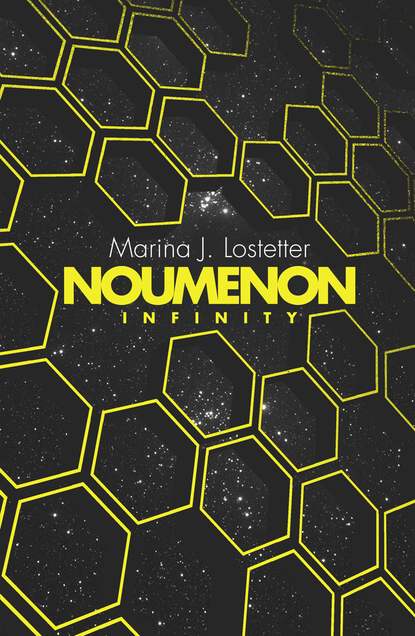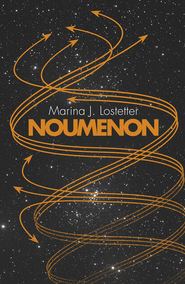По всем вопросам обращайтесь на: info@litportal.ru
(©) 2003-2025.
✖
Noumenon Infinity
Настройки чтения
Размер шрифта
Высота строк
Поля
“I don’t understand why we’re letting this conversation continue,” huffed the head of education. “Doctor Caznal’s fundamental misunderstanding of our entire social order can be amended on her own time. No one here is looking to put a new destination to a vote, so I suggest we move on.”
“No,” Caz shouted. “No. We were only supposed to move on to LQ Pyx if the destination proved fruitless—”
“It has,” he said.
“How can you say that? If you were being the objective scientists you’re all supposed to be—”
“I’m sorry, Caz, but I don’t think we’re the ones not being objective,” said Captain Onuora.
Caznal’s eyes shot to Hvmnd’s captain—her friend. Onuora’s dark eyes were sympathetic, and her tone matched. But every word that followed felt like a knife to Caznal’s back.
“We know you despise the decision to keep Doctor Baraka under when we arrived at the planemo. I think this decision feels like another betrayal to you. As though we’ve undermined not only the man, but his legacy. No one is suggesting we halt analysis on the data you’ve already collected. Nor should we stop examining the Nest. But the pursuit of the Nataré as a people—as Web builders—has to end. We have other work to do—that we were always meant to do. It’s not personal. Don’t make it personal.”
This is my entire life … how can it not be personal?
“That’s not what this is about,” Caz said meekly.
“Either way. As a colleague, and as a friend, I suggest you let us move on to the next order of board business.”
With her will suddenly drained, it felt as though the bones had been plucked from Caznal’s body. She sank into a chair with no firmness to her movement.
Onuora was wrong. Wasn’t she? Caz wasn’t trying to overemphasize the importance of the Nataré because of Dr. Baraka. No, of course not. Wouldn’t the botanists be surprised and angry to have their hybrid programs suddenly stopped? Wouldn’t the engineers cry foul if they lost access to the Nest or the Web node? She’d just had the rug pulled out from under her professional life. That was it. That was all.
“Mom? You all right?”
A soft crash-boom of distant waves underscored Min-Seo’s voice. As water rushed up Caznal’s calf before receding again, she opened one eye.
Her grown daughter leaned over her, hands on her hips, her computing jumper left behind in exchange for a tank top and slacks.
The wave pool sloshed once more, and the sound system continued to play real surf sounds. Every ten minutes, a gull squawked. Up and down the sandy beach, other crew members read books or took naps. One woman on a beach towel scowled at Min-Seo.
“This is the quiet pool,” Caz reminded her at a whisper.
“Oh, sorry.” She settled in beside her mother, rolling up the cuffs of her trousers to stick her feet in the damp silica. Fine, pale grains stuck to her toes.
“Thought the three of you were supposed to be on a romantic vacation,” Caz said, noting neither Hiro nor Kexin, her daughters-in-law, nearby.
“We are. I could tell things were getting a little spicy, so I excused myself.” She checked her forearm implant for the hour. “I’ll get back just in time for the cuddles. You know what I always say …” She gave her mother a wink.
Caz cleared her throat and recited, “‘The advantages of being an asexual panromantic in a polyamorous relationship.’ By the ships, that is a mouthful.”
“Which is why I like to hear you say it. It’s life affirming and a tongue twister all in one.”
The sand was both rough and soft, a dichotomy Caz enjoyed. She slipped her fingers beneath the surface, down where it was dark, and cool—untouched by the sun-mimicking lamps overhead. “So, you happened to find me, or …?”
“I got a message from Dad.”
“My pilikua is worried about me?”
“Yes. He said you haven’t been yourself since—”
“Since the board voided the importance of my entire field of study? Yeah, you could say that.”
“Shh,” hissed the woman on the beach towel.
With a dramatic eye-roll, Caz heaved herself out of the sand, clearly giving Min-Seo whiplash as she was settling in. “Come on,” Caz said, giving her a hand up. “If you’re going to cheer me up, we better go someplace else. Preferably a place with a lot of chocolate or mod-coca.”
Hand in hand, they wandered away from Shambhala’s wave pools, past its gyms, and down to the dessert bars. These were new—an upgrade installed before second launch. Food printers allowed chefs to turn convoy basics into a variety of concoctions—both healthy and not so. The professional behind the counter scanned your biometrics, looked up what you’d already eaten that day, then created a specialized dessert menu based on your remaining rations and current blood sugar.
Science at its best, Caz thought.
“Oh, Gyeongju bread,” Min-Seo said, sniffing the air as a crew member strolled by with a plate of three of the bean paste–filled rolls.
“Go for it,” Caz said, “I think I’m going for a pick-me-up of the green-leaf variety.”
“Meet at our star-window?” Min-Seo asked.
“Of course.”
The mod-coca dispensary was a charming little nook that mirrored the tea dispensary on the opposite side of what had come to be known as “dessert lane.” Caz chose a small packet of dried leaves for chewing and the botanist in charge took vice points off her rations file.
The first pinch was bitter, had a bit of a sulfide bite to its bouquet, but it settled nicely in her cheek as she made her way to the meeting spot. Relaxing as the chew was, she knew it would do little to help her depressive mood—unless it magically imbued her with the ultimate powers of persuasion. How could she make an entire society realize its error in judgment?
The star-windows were located on the ship’s topmost level. During SD dives, they displayed a false-view of space. Nebulae would engulf them in colorful haze. Dying binaries would dance by. Stars would twinkle balefully in the distance.
Now, they were true windows. Floor-to-ceiling, turned to give the perfect top-down view of the planemo, which was largely dark save for the single crater overrun with human lighting. They were just far enough out that the dark spot was ringed with stars, and if you put your forehead against the glass—as Min-Seo and Caznal did now—letting your eyes cross just so, you might feel, for a moment, like you were falling into a black hole.
“It’s been two weeks,” Min-Seo said between bites.
“I know.” Caz sighed, her breath lightly fogging the window. The aluminosilicate glass was frigid against her skin. “And it’s not just me.”
“The whole Nataré division,” Min-Seo said knowingly. “Vega said she’s barely gotten two words out of Ivan.”
“Did you hear they’re thinking of reassigning our lines?” she asked Min-Seo. “Putting the next clones back into the business they were chosen for?”
Min-Seo stopped her chewing, a wad of pastry and beans rounding out her cheek. “But I thought they said you could still work on the crater samples.”
“Yep, we—meaning those of us currently working. Once we’re retired, they figure it’s all clones on the Web train once more.”
“It’s too bad it has to be one or the other. I mean, doesn’t it make sense to do both? We haven’t heard back from Earth yet, we know they can’t be counted on to follow up. We’re the explorers, we should be doing everything we can.”
Caz shrugged and stuffed more coca in her mouth against her gums. The bulge in her lip made her sound funny, but Min-Seo wasn’t one to take a cheap jab. “Unfortunately, one convoy equals one mission. They’ve narrowed down what that mission is, and my people are just SOL.”
“Why does it have to be that way?” Min-Seo asked. “I mean, yes, one convoy can only do so much. But we have twelve ships.”
“Oh, you know the answer to that,” Caz dismissed. “Those oh-so-perfect original P.U.M. mission designers decided we needed nine ships and a hundred thousand people so we don’t implode on a social level.”
“We’ve got three ships extra, then.”
Другие электронные книги автора Marina J. Lostetter
Noumenon




 0
0






